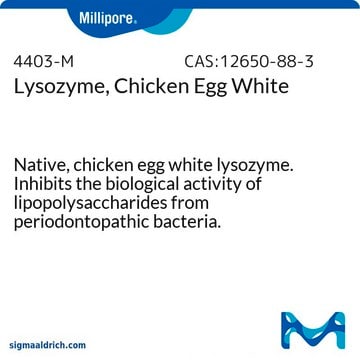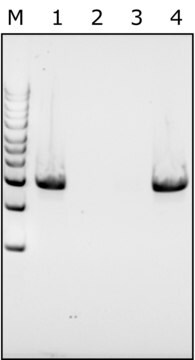L7773
Lysozyme from chicken egg white
aseptically filled
Synonym(s):
Mucopeptide N-acetylmuramoylhydrolase, Muramidase
About This Item
Recommended Products
sterility
aseptically filled
Quality Level
form
powder
enzyme activity
≥40000 units/mg protein
mol wt
single-chain 14.3 kDa
UniProt accession no.
storage temp.
−20°C
Gene Information
chicken ... LYZ(396218)
Looking for similar products? Visit Product Comparison Guide
Application
Biochem/physiol Actions
The enzyme is active over a broad pH range (6.0 to 9.0). At pH 6.2, maximal activity is observed over a wider range of ionic strengths (0.02 to 0.100 M) than at pH 9.2 (0.01 to 0.06 M).
Unit Definition
Preparation Note
Other Notes
Signal Word
Danger
Hazard Statements
Precautionary Statements
Hazard Classifications
Resp. Sens. 1
Storage Class Code
11 - Combustible Solids
WGK
WGK 3
Flash Point(F)
Not applicable
Flash Point(C)
Not applicable
Personal Protective Equipment
Certificates of Analysis (COA)
Search for Certificates of Analysis (COA) by entering the products Lot/Batch Number. Lot and Batch Numbers can be found on a product’s label following the words ‘Lot’ or ‘Batch’.
Already Own This Product?
Find documentation for the products that you have recently purchased in the Document Library.
Customers Also Viewed
Protocols
This enzymatic rate determination may be used for Lysozyme products. It is not to be used to assay recombinant or insoluble Lysozyme on agarose.
This enzymatic rate determination may be used for Lysozyme products. It is not to be used to assay recombinant or insoluble Lysozyme on agarose.
This enzymatic rate determination may be used for Lysozyme products. It is not to be used to assay recombinant or insoluble Lysozyme on agarose.
This enzymatic rate determination may be used for Lysozyme products. It is not to be used to assay recombinant or insoluble Lysozyme on agarose.
Our team of scientists has experience in all areas of research including Life Science, Material Science, Chemical Synthesis, Chromatography, Analytical and many others.
Contact Technical Service







